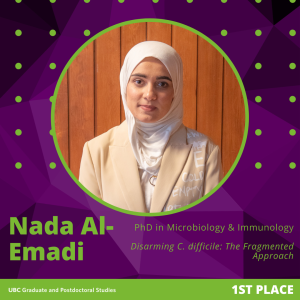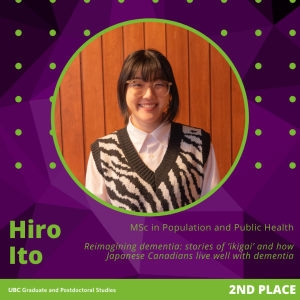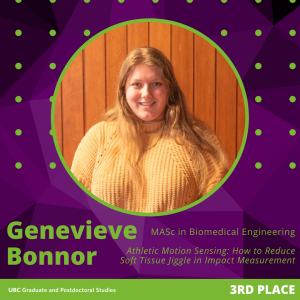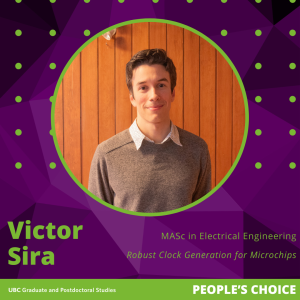After 13 heats, featuring nearly 130 presenters, the UBC Three Minute Thesis (3MT) competition culminated in the Final event on Thursday, March 14. Four graduate students walked away with top honours.
First place: Nada Al-Emadi, Disarming C. difficile: The Fragmented Approach
Nada Al-Emadi is doing her PhD in Microbiology and Immunology, supervised by Drs. Ted Steiner and Laura Sly. Her research looks at C. difficile infection and how to better treat these infections using alternative methods. The current treatments for C. difficile use strong antibiotics, which can cause harm by killing good gut bacteria as well. By using antibodies, Nada hopes to better treat infections with accessible, effective methods. "I just started this project a few months ago," says Nada, "but the results with the cells so far have been responding well in mice. Hopefully we can take it to clinical trials."
second place: Hiro Ito, Reimagining dementia: stories of 'ikigai' and how Japanese Canadians live well with dementia
Hiro Ito is supervised by Dr. Susan Cox, working towards MSc in Population and Public Health. Her work centers on culturally appropriate care for Japanese Canadians living with dementia. She was disappointed in the lack of research in this area and soon discovered the "most recent study" was more than 20 years old. She is interviewing and working with people in the Japanese Canadian community who are living with dementia - including caregivers and family - focusing on ikigai. Ikigai is a Japanese word which can be described as having a sense of purpose, or reason to live.
third place: Genevieve Bonnor, Athletic Motion Sensing: How to Reduce Soft Tissue Jiggle in Impact Measurement
Genevieve Bonnor is supervised by Dr. Calvin Kuo and is working on her MASc in Biomedical Engineering. Her research looks at using sensory motion data to better understand and prevent injuries. She had been interested in knee injuries and was able to align her work with Dr. Kuo's research in motion sensing in soccer. The sensory motion detectors are typically placed on tissue, not bone, thus resulting in "jiggles" from the underlying layers of far, muscle and bone. Her method will use ballistic gel and sensors placed directly on the bone to gather data, reducing the jiggles, and allowing for better interpretation of results from traditional sensory motion captures.
people's Choice winner: Victor Sira, Robust Clock Generation for Microchips, MASc in Electrical Engineering
Victor Sira is an MASc student in Electrical Engineering, supervised by Dr. Sudip Shekhar. His presentation, Robust Clock Generation for Microchips, received the People's Choice award for best presentation. His research looks at microchips and improving efficiency to save power. "Every time we go on the Internet, such as going on Facebook, or to make an Amazon purchase, that has a real impact on our energy waste," says Victor. His work hopes to improve efficiency without wasting as much power.
Other finalists for the event included:
- Katherine Baillie, Office politics: studying dominant negative mutations in DNA2 to improve cancer treatment, PhD in Interdisciplinary Oncology, supervised by Dr. Peter Stirling
- Marina Mehling, Tree bark for clean water, PhD in Chemical and Biological Engineering, supervised by Dr. Orlando Rojas
- Ahmed Kabil, Scared to be scarred? Prevent gut fibrosis with bile acids, PhD in Biomedical Engineering, supervised by Dr. Kelly McNagny
- Jamie Kwon, Developing a MicroRNA Biomarker for Oropharynx Cancer, MSc in Experimental Medicine, supervised by Dr. Cathie Garnis and Dr. Eitan Prisman
- Andrea Olaizola, Can CBD be used to treat Parkinson’s disease?, MSc in Pharmaceutical Sciences, supervised by Dr. Jessica Kalra
- Angeline Wu, When sugar Isn’t sweet: Glycosylation in Rheumatoid Arthritis, MSc in Pharmaceutical Sciences, supervised by Dr. Simon Wisnovsky
Congratulations to the finalists! Nada will represent UBC at the Western Regional Competition on May 8.
Videos from the semi-finals and final event will be on our YouTube channel in the coming weeks.
Thank you to our participants, judges, hosts and organizers
3MT depends on volunteer organizers, hosts, judges, presenters, and volunteers from many UBC faculties, departments and units. This year nearly 130 graduate students took part in preliminary virtual 3MT heats organized by various faculties and departments. Thirty graduate students progressed to the semi-final competitions, with only ten moving on to the final event. Thank you to everyone who presented, judged, organized or volunteered at a 3MT event. UBC 3MT would not be possible without the dedication and hard work of so many volunteers.



